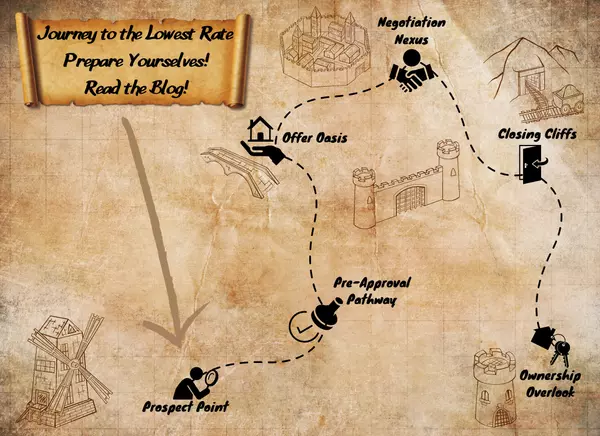How to Conduct a Thorough Title Search: A Comprehensive Guide

How to Conduct a Thorough Title Search
Navigating the world of real estate can be a complex task, and one crucial aspect often overlooked is the title search. A title search is a thorough examination of property records to ensure the seller has a legal right to sell the property. It also uncovers any claims or liens on the property.
This article aims to guide you through the process of conducting a comprehensive title search. by providing step-by-step instructions, tips, and insights into the intricacies of this task. Whether you're a real estate professional, an investor, or a homebuyer, this guide will be beneficial.
Understanding Title Searches
A title search is a critical step in the real estate transaction process. This involves checking public documents to make sure someone owns a property legally. The aim is to verify that the seller has the legal authority to sell the property.
Additionally, it is important to ensure there are no outstanding claims or encumbrances on the property. These could include unpaid taxes, judgments, or mortgages that could affect the buyer's ownership rights.
Here are the key elements involved in a title search:
- Property Records: These include deeds, mortgages, wills, court judgments, and tax records. They provide a history of transactions involving the property.
- Legal Description: This is a detailed description of the property, including its boundaries and location.
- Ownership History: This traces the ownership of the property back to its original owner.
- Liens and Encumbrances: These are claims against the property that could affect the transfer of ownership.
- Easements and Restrictions: These are rights and limitations associated with the property, such as access rights or building restrictions.
Understanding these elements is crucial for conducting a thorough search.
The Importance of a Title Search in Real Estate
In real estate, a title search is not just a formality. It's a crucial step that can make or break a property deal. The primary purpose of a the search is to protect the buyer. It ensures that the buyer is acquiring a property free of any legal issues or financial obligations. Without a thorough search, a buyer could unknowingly inherit a property with unpaid taxes, liens, or other encumbrances.
A title search also protects the lender. Most mortgage lenders require one before approving a loan. This is to ensure that their investment is secure. If a property has unresolved issues, it could affect its value and the lender's ability to recoup their investment in the event of a default.
In essence, it is a risk management tool that helps to identify and address potential issues before they become costly problems. It provides peace of mind to all parties involved in a real estate transaction.
Step-by-Step Guide to Performing a Title Search
Conducting a title search may seem daunting, but it doesn't have to be. With the right approach and resources, you can perform a thorough search. Here's a step-by-step guide to help you navigate the process:
- Identify the Property: You'll need the property's legal description and the current owner's name. This information can be found on the property deed.
- Visit the County Clerk's Office or Online Portal: This is where all property records are kept. You'll be looking for the chain of title, which is the history of ownership of the property.
- Review the Chain of Title Carefully: Look for any gaps in ownership or unexplained transfers. These could be signs of potential issues.
- Check for Liens, Easements, or Covenants: These are legal obligations or restrictions that could affect the property's value or use.
- Consult with a Real Estate Attorney if Issues Arise: They can help you understand the implications and possible solutions.
Identifying Potential Issues and Red Flags
During a title search, you may come across several potential issues. These are often referred to as "clouds" on the title. Common issues include unpaid taxes, liens, and judgments against the property. These must be resolved before the property can be sold.
Other red flags could be gaps in the chain of title, unrecorded deeds, or discrepancies in the property description. These could indicate potential legal issues that need to be addressed.
Title Search vs. Title Insurance: What's the Difference?
A title search and title insurance serve different purposes in a real estate transaction, but both are crucial. Understanding the difference between them can help you navigate the process more effectively.
A title search is a comprehensive review of public documents to confirm the lawful possession of a property. It identifies any liens, encumbrances, or potential legal issues that could affect the property's transfer. The goal is to ensure a clear title, free of any claims or disputes.
On the other hand, title insurance is a policy that protects the buyer and lender from future claims against the property. Even with a thorough title search, certain issues might not be apparent. These could include errors in public records, undisclosed heirs, or fraud. Title insurance provides financial protection against such unforeseen problems.
Conducting a Title Search in Different States
Conducting a title search can vary from state to state due to differences in property laws and record-keeping practices. It's essential to understand these nuances to ensure a thorough and accurate title search.
- Title Search Texas: In Texas, property records are maintained at the county level. You would need to visit the county clerk's office where the property is located to conduct a title search. Texas also has unique property laws, such as community property rules, that can affect a title search.
- Mass Title Search: A mass title search involves searching titles for multiple properties, often across different states. This requires a more systematic approach and familiarity with various state laws and databases. It's often best to engage a professional title search company for such large-scale searches to ensure accuracy and efficiency.
Legal Implications and How to Address Discrepancies
A flawed title search can have serious legal implications. It can lead to disputes over property ownership, financial losses, and even legal action. Hence, it's vital to perform an extensive title investigation and resolve any inconsistencies as soon as possible.
If you uncover discrepancies during a title search, consult with a real estate attorney. They can provide guidance on how to resolve the issues. In some cases, you may need to clear the title by paying off liens or resolving other encumbrances. Addressing these issues early can prevent costly legal problems down the line.
The Value of a Thorough Title Search
A thorough title search is essential in any real estate transaction, serving as a critical check before finalizing a property purchase. This process involves a detailed review of the property's history to confirm that the seller has the legal right to sell it and that there are no hidden claims, liens, or other encumbrances. Identifying issues like unpaid taxes, undisclosed heirs, or easements during a title search allows for resolution before the sale concludes, ensuring a clean transfer of property rights.
For homebuyers, a title search is vital to protect their investment, making sure that the property is free of legal barriers that could affect ownership. Real estate professionals need to master comprehensive title searches to provide accurate information to clients and avoid potential legal issues in the future. Additionally, a title search can disclose important information about property boundaries, zoning restrictions, and existing easements, crucial for both buyers and sellers to make well-informed decisions.
Ultimately, conducting a detailed title search is a key step in ensuring a smooth and successful transaction, helping all parties involved make informed decisions and avoid surprises.
Q&A
Q: What is a title search in real estate? A: A title search is a thorough examination of property records to verify legal ownership and uncover any claims or liens against the property.
Q: Why is a title search important? A: A title search protects buyers and lenders by ensuring the property is free of legal issues or financial obligations.
Q: How do I conduct a title search? A: Identify the property, visit the county clerk's office, review the chain of title, check for liens or covenants, and consult a real estate attorney if issues arise.
Q: What are common issues found in a title search? A: Common issues include unpaid taxes, liens, judgments, gaps in ownership, and discrepancies in property descriptions.
Q: What is the difference between a title search and title insurance? A: A title search verifies legal ownership, while title insurance protects against future claims not uncovered in the search.
Like What You See? Follow For More!
If you found this guide helpful, consider following me on all my social media pages for more real estate insights and updates. Sign up right here on my website to view listings across the Greater San Antonio Area. And if you're looking for a real estate agent who's willing and ready to assist you from start to finish, whether it's finding your dream home or selling your current one on your timeline, don't hesitate to reach out. I'm here to help you every step of the way.
Sources:
Categories
Recent Posts












